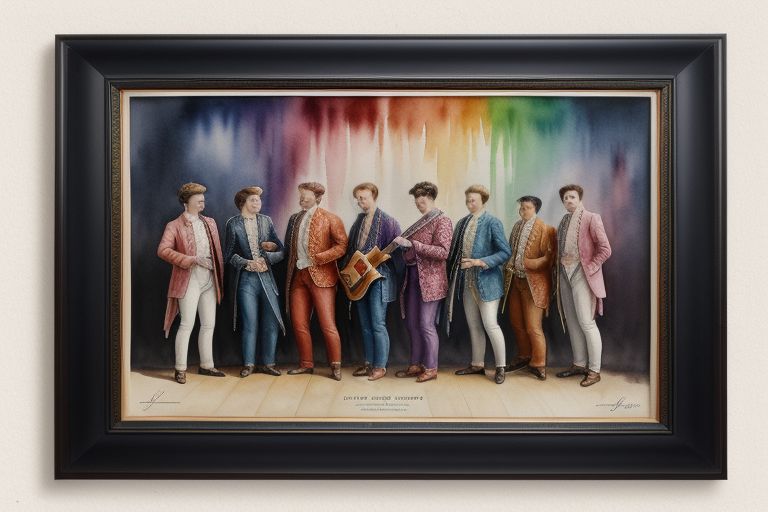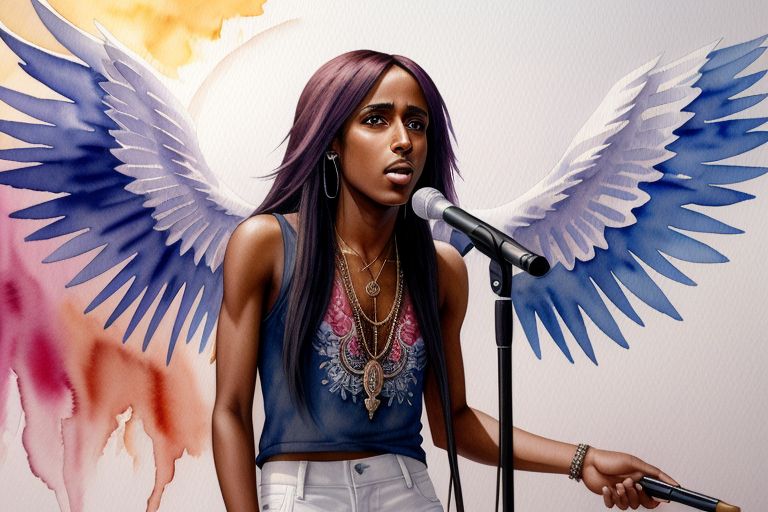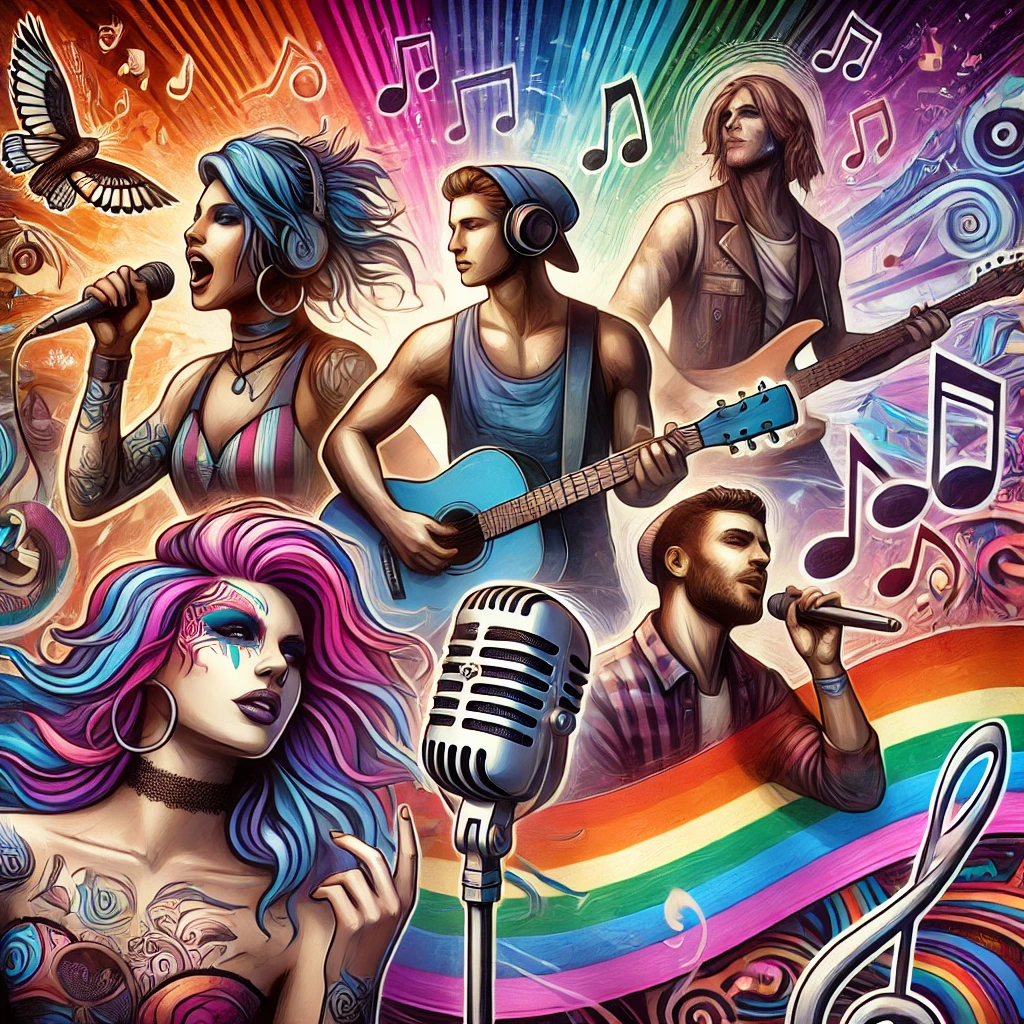Are you an Intersex or Transgender Artist? Let’s Connect!
Google’s Deep Dive Podcast: Breaking the Barriers: The Lack of Representation of Transgender and Intersex Artists in Mainstream Music
Introduction
The music industry has historically marginalized transgender and intersex artists, leaving their stories untold and their voices unheard. This article aims to shed light on the critical need for greater representation and inclusivity within the mainstream music scene.

Historical Context
For decades, transgender and intersex artists have been overlooked by the mainstream music industry, facing systemic barriers that hinder their success. This lack of representation not only affects the artists themselves but also deprives audiences of diverse perspectives and experiences.

Current Landscape
Despite some recent advancements, the music industry still grapples with deeply ingrained biases. Emerging transgender and intersex artists are beginning to break through, yet many challenges remain, including limited access to resources and visibility.

Personal Stories
Artists like Sam Smith and Angel Haze share their journeys in an industry that often silences them. Their stories highlight resilience and the urgent need for broader acceptance and support.


Call to Action
We invite you to support transgender and intersex artists by following them on social media, attending their performances, and advocating for inclusivity in the music industry. Your voice matters!
Conclusion
Representation in music is crucial. By uplifting transgender and intersex artists, we can create a richer, more diverse musical landscape that benefits everyone.
Briefing Doc: Lack of Representation of Transgender and Intersex Artists in Mainstream Music
Source: “Breaking the Barriers: The Lack of Representation of Transgender and Intersex Artists in Mainstream Music” by TATANKA
Main Themes:
- Underrepresentation: Transgender and intersex artists are significantly underrepresented in the mainstream music industry.
- Historical Discrimination: The music industry has historically reflected societal prejudices, contributing to the marginalization of these artists.
- Need for Inclusivity: Increased representation is crucial for challenging stereotypes, inspiring future generations, and fostering a more equitable music landscape.
Key Facts and Ideas:
- Challenges Faced by Transgender and Intersex Artists:
- Stereotyping and Discrimination: These artists frequently encounter harmful stereotypes that limit their career opportunities.
- Lack of Mentorship and Support: They often struggle to find supportive networks and mentors within the industry.
- Financial Hardships: Discrimination and limited opportunities, coupled with potential medical transition costs, create financial barriers.
- Limited Visibility: Mainstream platforms and media often overlook these artists, restricting their exposure to wider audiences.
- Importance of Representation:
- Challenging Stereotypes: Visibility helps dismantle harmful stereotypes and misconceptions about transgender and intersex individuals.
- Inspiring Younger Generations: Representation can encourage young transgender and intersex individuals to pursue their musical aspirations.
- Promoting Inclusivity: A more diverse and inclusive music industry fosters a sense of belonging and acceptance for all artists.
Quotes:
- “The music industry has long been a reflection of societal values and trends. However, when it comes to representation of transgender and intersex artists, the mainstream music scene has often fallen short.”
- “Transgender and intersex artists often face harmful stereotypes and discrimination, which can hinder their career progression.”
- “By seeing transgender and intersex artists succeed, audiences can challenge harmful stereotypes and misconceptions.”
- “A more inclusive music industry can foster a sense of belonging and acceptance for all artists.”
Call to Action:
The article implicitly calls for a concerted effort by the music industry to address the challenges faced by transgender and intersex artists and actively promote inclusivity. This includes challenging discriminatory practices, providing support networks, and increasing the visibility of these artists on mainstream platforms.
What is the main issue addressed in the article “Breaking the Barriers”?
The article highlights the lack of representation and the challenges faced by transgender and intersex artists in the mainstream music industry. It discusses the historical context of discrimination, the specific barriers these artists encounter, and the importance of increasing their visibility.
What are some historical challenges faced by transgender and intersex individuals in the arts?
Historically, transgender and intersex individuals have faced significant marginalization and discrimination across various aspects of life, including the arts. The music industry, often characterized by conservative and heteronormative values, has presented a particularly challenging environment for these artists.
What are some of the specific challenges faced by transgender and intersex artists in the music industry?
The article outlines several challenges:
- Stereotyping and Discrimination: Transgender and intersex artists frequently encounter harmful stereotypes that limit their opportunities and hinder career advancement.
- Lack of Mentorship and Support: Finding mentors and support networks within the industry is difficult, leading to feelings of isolation and exclusion.
- Financial Hardships: Discrimination, limited opportunities, and the cost of medical transitions often create financial burdens for these artists.
- Limited Visibility: Mainstream music platforms and publications often overlook transgender and intersex artists, reducing their exposure to wider audiences.
Why is it important to have representation of transgender and intersex artists in mainstream music?
Increased representation is crucial for several reasons:
- Challenging Stereotypes: Visibility helps dismantle harmful stereotypes and misconceptions about transgender and intersex individuals.
- Inspiring Younger Generations: Seeing successful transgender and intersex artists can inspire young people to pursue their own musical dreams.
- Promoting Inclusivity: A more inclusive industry fosters a sense of belonging and acceptance for all artists, enriching the musical landscape.
Has there been any progress in the representation of transgender and intersex artists?
While the article acknowledges that some progress has been made, it emphasizes that there is still substantial work to be done to achieve adequate representation and equity for transgender and intersex artists in the music industry.
What is TATANKA?
Based on the provided excerpts, TATANKA appears to be a music platform and organization focused on promoting inclusivity and social justice within the music industry. They showcase a diverse range of musical content, including AI-generated music, and are committed to highlighting Indigenous voices and perspectives.
What is the mission of TATANKA?
TATANKA’s mission seems to be centered around using music as a tool for positive change. They aim to challenge conventional norms in the music industry, promote diversity and inclusivity, and highlight important social issues, particularly those related to Indigenous communities and environmental sustainability. Their tagline, “Music Meets Mission,” encapsulates this commitment.
What are some of the other themes and topics explored on the TATANKA website?
Beyond representation in music, TATANKA seems to engage with a variety of themes, including:
- AI and Music: They explore the intersection of artificial intelligence and music creation, showcasing AI-generated tracks and discussing the future of music technology.
- Indigenous Rights and Culture: They actively promote Indigenous voices, music, and perspectives, highlighting issues related to Indigenous rights and cultural preservation.
- Sustainability and Environmentalism: TATANKA demonstrates a commitment to environmental sustainability, as evidenced by their focus on topics like climate change and the impact of mining on Indigenous communities.
Transgender and Intersex Representation in Mainstream Music
Short-Answer Quiz
Instructions: Answer the following questions in 2-3 sentences each.
- What is the historical context of transgender and intersex individuals in the arts and music industry?
- Identify and explain two challenges faced by transgender and intersex artists in the music industry.
- Why is financial hardship a particular challenge for some transgender and intersex artists?
- How does the lack of visibility impact the careers of transgender and intersex musicians?
- Explain how the representation of transgender and intersex artists can challenge stereotypes.
- How can the music industry become more inclusive for transgender and intersex artists?
- What is the significance of mentorship and support networks for transgender and intersex artists?
- How can the representation of transgender and intersex artists inspire future generations?
- What role can mainstream music platforms and publications play in promoting transgender and intersex artists?
- Why is it important to continue the conversation about representation of transgender and intersex artists in mainstream music?
Short-Answer Key
- Historically, transgender and intersex individuals have faced significant discrimination and marginalization in society, including the arts. The music industry, often characterized by conservative and heteronormative values, has contributed to this exclusion.
- Two challenges include stereotyping and discrimination, leading to limited opportunities and career progression, and the lack of mentorship and support, causing feelings of isolation and hindering professional growth.
- Financial hardship can be particularly acute for transgender and intersex artists due to discrimination limiting job opportunities and the potential costs associated with medical transitions.
- The lack of visibility in mainstream media and on music platforms limits the exposure of transgender and intersex artists to wider audiences, hindering their ability to gain recognition and build a fanbase.
- Seeing successful transgender and intersex artists challenges harmful stereotypes by showcasing their talent and normalizing their presence in the music industry, promoting a more accurate and inclusive understanding of these communities.
- The music industry can become more inclusive by actively supporting and promoting transgender and intersex artists, creating opportunities for mentorship and collaboration, and challenging discriminatory practices within the industry.
- Mentorship and support networks provide a safe space for transgender and intersex artists to connect with others who understand their experiences, gain valuable guidance from industry professionals, and build a sense of community.
- Representation can inspire young transgender and intersex individuals by providing role models who have achieved success in the music industry, encouraging them to pursue their own musical aspirations and demonstrating that their identities are not barriers to achieving their dreams.
- Mainstream music platforms and publications have a responsibility to actively feature and promote transgender and intersex artists, giving them equal opportunities for exposure and helping to diversify the musical landscape.
- Continuing the conversation ensures that the challenges faced by transgender and intersex artists remain in the public consciousness, promoting ongoing efforts to increase representation and create a more inclusive and equitable music industry.
Essay Questions
- Discuss the specific ways in which discrimination and marginalization have impacted the careers of transgender and intersex artists throughout music history. Provide examples to support your points.
- Analyze the relationship between the lack of representation of transgender and intersex artists and the perpetuation of harmful stereotypes. How can increased visibility contribute to a more nuanced and accurate understanding of these communities?
- Critically examine the role of mainstream music platforms, record labels, and media outlets in promoting inclusivity and diversity. What concrete steps can these entities take to support and amplify the voices of transgender and intersex artists?
- Explore the importance of mentorship and support networks for emerging transgender and intersex artists. How can these resources empower individuals to navigate the challenges of the music industry and foster a sense of belonging?
- Looking towards the future, envision a truly inclusive music industry that celebrates and embraces the contributions of transgender and intersex artists. What systemic changes are necessary to achieve this vision, and what role can individuals play in advocating for these changes?
Glossary of Key Terms
- Transgender: An umbrella term describing people whose gender identity differs from the sex they were assigned at birth.
- Intersex: A term used to describe individuals born with variations in their sex characteristics that do not fit typical binary notions of male or female bodies.
- Heteronormativity: The belief that heterosexuality is the default or preferred sexual orientation and that gender roles are inherently linked to biological sex.
- Stereotype: A widely held, oversimplified, and often inaccurate belief or image about a particular group of people.
- Discrimination: The unjust or prejudicial treatment of different categories of people, especially on the grounds of race, age, sex, or gender identity.
- Marginalization: The process of treating a person, group, or concept as insignificant or peripheral.
- Visibility: The state of being easily seen or noticed; in this context, it refers to the presence and recognition of transgender and intersex artists in the music industry.
- Inclusivity: The practice or policy of including people who might otherwise be excluded or marginalized, such as those who have physical or mental disabilities and members of minority groups.
- Mentorship: A relationship in which a more experienced or knowledgeable person guides and supports the professional development of a less experienced individual.
TATANKA Website Content Analysis
I. Homepage
- Header: Introduces the website, featuring language options, navigation links to music, information about TATANKA, and investor/talent portals. This section serves as the initial point of contact for visitors, offering both navigation and glimpses into the organization’s focus.
- “Breaking the Barriers” Article: Discusses the underrepresentation of transgender and intersex artists in the music industry, examining historical context, challenges, and the importance of representation. This article provides a critical analysis of inclusivity within the music industry and advocates for change.
- Music and News Sections: Features recent music releases and news articles related to indigenous communities and TATANKA’s work. These sections showcase TATANKA’s musical output and highlight their commitment to indigenous issues and AI integration in music.
- “About TATANKA” Section: Provides information about the organization’s mission, values, and projects, including their unique approach to music creation and cultural advocacy. This section expands on TATANKA’s identity and provides context for their music and initiatives.
- Footer: Includes contact information, copyright details, social media links, and a quote by Sitting Bull emphasizing respect for nature and collaboration. This section offers essential contact information and reinforces TATANKA’s core values through a powerful quote.
II. Mission Statement
- AI: Explains TATANKA’s innovative use of AI in music creation, highlighting its potential to break boundaries and empower marginalized communities. This section focuses on the transformative role of AI in music and its alignment with TATANKA’s mission.
- DEI: Outlines TATANKA’s commitment to diversity, equity, and inclusion, emphasizing their dedication to amplifying underrepresented voices in the music industry. This section underscores TATANKA’s dedication to social justice and representation within their organization and the broader music scene.
- SDGs: Details how TATANKA aligns its work with the United Nations’ Sustainable Development Goals, showcasing their commitment to environmental sustainability, social justice, and global well-being. This section demonstrates TATANKA’s global perspective and integration of social responsibility into their mission.
III. About Section
- FAQ: Answers frequently asked questions about TATANKA, providing further insights into their mission, music, and future plans. This section addresses common inquiries, offering a deeper understanding of TATANKA’s structure and goals.
- STAGE – ORCHESTRA AMERICANA: Describes TATANKA’s unique musical approach, blending orchestral elements with Americana influences. This section emphasizes TATANKA’s distinctive musical style and artistic vision.
- HERD: Presents a series of thought-provoking questions aimed at sparking reflection and dialogue about humanity’s relationship with the planet. This section encourages critical thinking about important global issues and aligns with TATANKA’s commitment to environmental awareness.
- THE COUNCIL – WISDOM CIRCLE: Explores the integration of indigenous wisdom and perspectives into TATANKA’s work, highlighting its importance for sustainability and cultural preservation. This section underscores the significance of indigenous knowledge and its application to contemporary challenges.
- “Damn Good Reasons” and “Ajima” Articles: Advocate for women’s empowerment and highlight the importance of matriarchal perspectives in society. These articles champion gender equality and celebrate diverse cultural traditions.
